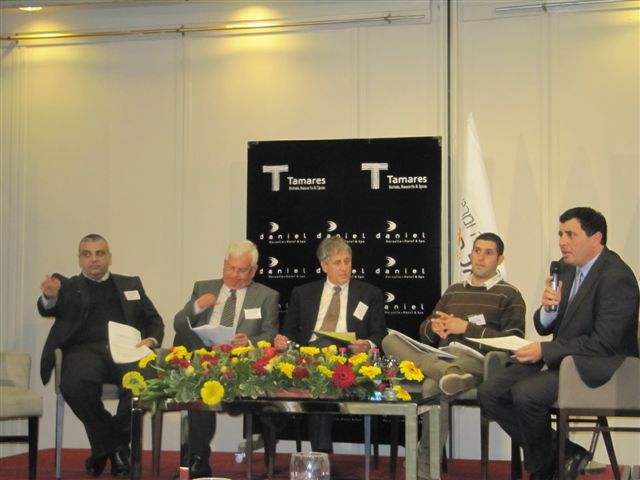
“TOURISM IS A BRIDGE FOR PEACE AND THAT IS WHY I AM HERE” DEPUTY CHAIRMAN OF THE BETHLEHEM HOTELS ASSOCIATION GEORGE ABU ATA TODAY AT THE HERZLIYA CONFERENCE ON TOURISM
“Tourism is a bridge for peace and that is why I am here, in order to explain what is going on in Bethlehem in terms of tourism. Tourists are coming in to Bethlehem to see the Church of the Nativity and Herodion and because overnight accommodation is cheaper there. Pilgrims feel good in Bethlehem, especially in the family hotels.”
This, according to Deputy Chairman of the Bethlehem Tourism Association George Abu Ata, who was speaking at a panel on the trends in accommodation for incoming tourists today (Monday) at the Herzliya Conference on Tourism. “One and a half million visitors come to Bethlehem every year and 20% of them stay in the city. We work mainly with groups from Europe – Italy, Spain, Holland and Russia. We also have some tourists from India and Nigeria who stay one or two nights. Bethlehem, like Israel, suffers from the difficult times in the region and in 2004 all the hotels in Bethlehem were closed. Since that time, we began excellent cooperation with the Israel Tourism Ministry and we are satisfied with the results and we hope to continue this fruitful cooperation.’
Also participating in the panel were the head of the Israel Hotels Associations Shmuel Tzurel, head of the Israel Incoming Tour Operators Association Ami Etgar and Tellavista website founder and partner Roi Ziv.
Ami Etgar noted that “there must not be a sectarian tourism that benefits one area or another. There is tourism that comes to inexpensive hotels and leaves limited money in the economy and there is tourism that comes into vacation apartments and leaves significant money in the economy. Therefore the tourism product needs to include both. I believe that vacation apartments are good for the economy, tens of thousands of foreign residents have purchased apartments that they rent out for long periods to tourists – we are talking about tourists that spend both more time and money in Israel.”
According to Shmuel Tzurel, “it does not matter how many tourists arrive in Israel, but rather what is their contribution to the economy. How may tour guides are they using, how many buses and how many overnights in hotels. We welcome competition, including rental apartments. However, this competition must be based on the same conditions and we wait to see what will happen when these rental apartments will pay municipal tax in line with their use, when they are answerable to fire safety regulations etc.”
Roi Ziv said that there are 3,000 vacation apartments listed on the Tellavista website, of which at least 1,000 are active. “Most of the apartments are in Tel Aviv, but there are also quite a few in Jerusalem, Netanya, Herzliya, Bat Yam, Eilat, Ramat Hasharon and Ramat Gan. A visitor arriving in Israel on business for one to two months will prefer to stay in a furnished apartment than a hotel room.”
Given that the numbers of incoming tourists in recent years has grown far more than the number of overnights in hotels, the panel discussed the trends in the accommodation preferences for incoming tourists. It would appear that more and more tourists prefer to stay in rented apartments, be they private rentals or apartments rented exclusively to tourists. The data presented pointed to a decrease in the number of overnight stays in Israel to the benefit of overnight stays in Bethlehem and indications that point to an increase in the number of overnight stays in facilities that belong to the churches that are not included in the official statistics.
In 2012, there was a record 22.1 million overnight stays in hotels, 1% more than in 2011. Of these overnights, 9.7 million were tourists, 2% less than in 2011. Despite this, there was an increase of 2% in the number of tourists staying in Israel more than one night (8 nights on average). 12.4 million overnights were Israelis, 4% more than in 2011. The average occupancy in hotels stood at 66% in 2012, similar to the occupancy levels in 2011. There was a 2% increase in occupancy levels in the south, while in Hiafa, the center and Tel Aviv there was a decrease in occupancy levels. There was no change in occupancy levels in Jerusalem and the north. The highest occupancy levels were recorded in the Tel Aviv area (71%) and the lowest in the North (57%)
Photo Silvia Golan








